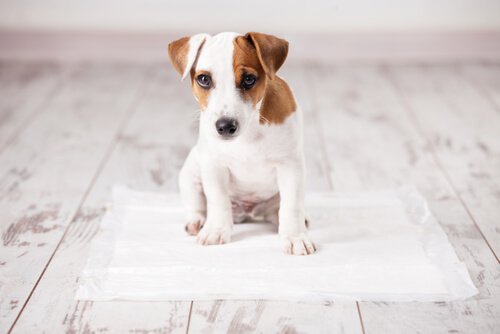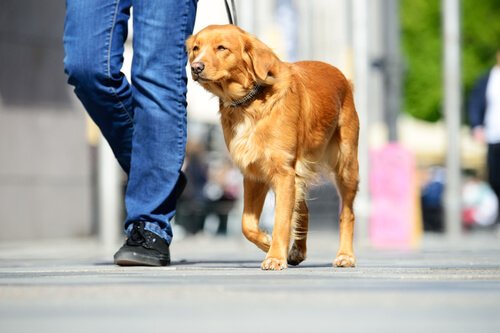How To Stop Your Dog Going From Going To The Bathroom In His Bed


Written and verified by the lawyer Francisco María García
Dogs are many people’s favorite pet. They’re very emotional and easily form a bond with their owners. However, sometimes, it can difficult to stop their dog from going to the bathroom inside his bed.
The Owner Is Responsible
In most cases, this sort of behavior falls on the owner. People often humanize their pets and they forget that dogs are pack animals. Dogs come from hierarchical societies where the alpha dog has control over the rest of the pack. Therefore, the owner needs to be a strong leader to stop bad behavior.
Training your dog to have good hygiene habits is the owner’s responsibility. It’s difficult to live with an animal that goes to the bathroom wherever he feels like going, so you’ll need to teach him to do it outside.
When Does Your Dog Go To The Bathroom In His Bed?
There are many possible reasons that your dog goes to the bathroom in his bed. Continue reading to learn about the most common reasons:
- Changes in diet.
- Accidents at home, which is more common with puppies.
- Medication which causes incontinence.
- Incontinence followed by submissive behavior makes him go to the bathroom when he’s scared or overly excited.

There are some situations where a dog doesn’t know where to urinate. Maybe he’s marking his territory (which is very common) or it could be due to a health problem such as an infection, illness, or anxiety.
How Can You Stop Your Dog From Going To The Bathroom In His Bed?
To solve this problem, you need to set of some rules:
- Always eat before your dog.
- Always go out before your dog when leaving the house.
- Make sure you always have your dog by your side when you are out for a walk.
- Your dog should sleep in his bed and you should sleep in your own.

Recommendations
The following is also recommended:
- First, don’t waste energy on scolding him. It’s better to correct his behavior in a positive manner. Otherwise, you’ll make him feel more vulnerable and you could cause him to negatively react. It’s a good idea to you reward your dog when he goes to the toilet in the right place.
- Clean anything that is soiled. Use enzyme-based cleaners and apply them directly to the stains. Afterwards, wash the sheets and the bed itself.
- Seek veterinarian attention, especially if your dog’s incontinence is caused by medications, dietary changes, or if you suspect a health problem.
- Go out on routine walks without much space in between each outing. This is really important because you’ll be able to reward your dog each time he goes to the bathroom outside of the home.
- When you get home, say hello to your dog calmly and patiently. This can help take care of the problem, especially for puppies.
- Establish a healthy lifestyle. Provide your dog with a balanced diet and exercise on a regular basis. For example, running, walking, playing, etc.
- Give your dog enough mental stimulation. This will help your dog to be calmer and have less anxiety or stress. According to veterinarians, using toys like Kong can reduce stress and anxiety.
Ancestral Traditions
Wolves and dogs, even when puppies, have the instinct to leave the den when they need to do go to the bathroom in order to keep their home clean and protect themselves from enemies by keeping the smell of their excrement away from home.
These century-old techniques need to be used by owners. You need to take advantage of this canine instinct in order to get good behavior from your dog, as well as making sure they don’t go to the bathroom in their bed.
In order for a dog to learn good behavior, more active participation is required by the owner. Dogs don’t do this sort of thing because they’re angry, vengeful or anything of that sort because dogs don’t have these types of feelings.
If your puppy goes to the bathroom in his bed, then this is a complicated issue that takes place for many reasons. However, aside from some exceptional cases, with a bit of patience, consistency, and hard work you can solve this problem.
This text is provided for informational purposes only and does not replace consultation with a professional. If in doubt, consult your specialist.